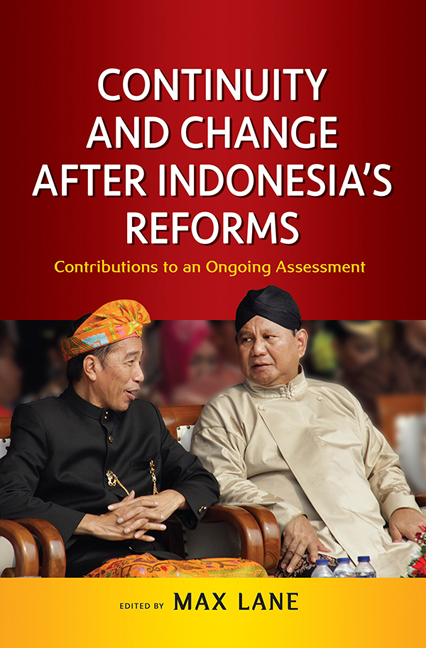Book contents
- Frontmatter
- Contents
- Preface
- About the Contributors
- 1 Indonesia's New Politics: Transaction Without Contestation
- 2 Indonesian Parties Twenty Years On: Personalism and Professionalization amidst Dealignment
- 3 Ideologies of Joko Widodo and Indonesian Political Parties
- 4 Political Islam Movements and Democracy in Indonesia: A Changing Landscape?
- 5 Creating Leadership Legitimacy in Post-Reform Indonesia
- 6 The Political Middle Class in Post-Soeharto Era Indonesia
- 7 The Politics of Centre–Local Relations in Contemporary Indonesia
- 8 The Roots and Actors of Corruption in the Political Realm
- 9 Why Is It Really Hard to Move On? Explaining Indonesia's Limited Foreign Policy Reform After Soeharto
- 10 Papua under the Joko Widodo Presidency
- 11 Youth “Alienation” and New Radical Politics: Shifting Trajectories in Youth Activism
- Index
8 - The Roots and Actors of Corruption in the Political Realm
Published online by Cambridge University Press: 06 September 2019
- Frontmatter
- Contents
- Preface
- About the Contributors
- 1 Indonesia's New Politics: Transaction Without Contestation
- 2 Indonesian Parties Twenty Years On: Personalism and Professionalization amidst Dealignment
- 3 Ideologies of Joko Widodo and Indonesian Political Parties
- 4 Political Islam Movements and Democracy in Indonesia: A Changing Landscape?
- 5 Creating Leadership Legitimacy in Post-Reform Indonesia
- 6 The Political Middle Class in Post-Soeharto Era Indonesia
- 7 The Politics of Centre–Local Relations in Contemporary Indonesia
- 8 The Roots and Actors of Corruption in the Political Realm
- 9 Why Is It Really Hard to Move On? Explaining Indonesia's Limited Foreign Policy Reform After Soeharto
- 10 Papua under the Joko Widodo Presidency
- 11 Youth “Alienation” and New Radical Politics: Shifting Trajectories in Youth Activism
- Index
Summary
Introduction
Political corruption is a major source of many problems in Indonesia. The main reason for corruption being so widespread in this sphere is the high cost that burdens politicians when attempting to be elected as members of central or district parliaments, senators, governors or mayors, and even president. I will discuss in this chapter the major examples of corruption in the election process for local leaders (Pemilihan Kepala Daerah, Pilkada), both prior to and after the change to direct elections for these posts. Pilkada cases were selected as the example for this chapter because it has been within the new electoral system that corruption has most flourished. Ironically, Pilkada initially was believed to be the key to the fundamental changes in local politics after the New Order era to facilitate the end of the systemic, centralistic corruption and non-democratic regime. Unfortunately, the results go in the opposite direction.
The New Order: Centralization and Political Hegemony
During the New Order, the election of heads of regional government was regulated by Law No. 5/1974 on regional government.
In this law, Regional House of Representatives (Dewan Perwakilan Rakyat Daerah, DPRD) members were given the authority to elect heads of regional government, but the nomination and inauguration of proposed candidates were carried out by the Ministry of Home Affairs. This was the form of central government intervention into the regions and was evident in Article 15 governing the election of the governor:
Kepala Daerah Tingkat I dicalonkan dan dipilih oleh Dewan Perwakilan Rakyat Daerah dari sedikit-dikitnya tiga orang dan sebanyak-banyaknya lima orang yang telah dimusyawarahkan dan disepakati bersama antara Pimpinan Dewan Perwakilan Rakyat Daerah/Pimpinan Fraksi-fraksi dengan Menteri Dalam Negeri.
(The head of the First Level Region is nominated and elected by the Regional House of Representatives from at least three people and as many as five people who have discussed and mutually agreed between the heads of the Regional House of Representatives and leaders of the factions with the Ministry of Home Affairs.)
Then, Paragraph (2) mentioned:
Hasil pemilihan yang dimaksudkan dalam Ayat (1) pasal ini diajukan oleh Dewan Perwakilan Rakyat Daerah yang bersangkutan kepada Presiden melalui Menteri Dalam Negeri sedikit-dikitnya dua orang untuk diangkat salah seorang di antaranya.
- Type
- Chapter
- Information
- Continuity and Change after Indonesia's ReformsContributions to an Ongoing Assessment, pp. 171 - 194Publisher: ISEAS–Yusof Ishak InstitutePrint publication year: 2019



